Poignant stories of desperation and hope play out in Mumbais elder care centres, where caregivers are caught between emotional responsibility and practical fear they never faced before the Coronavirus decided seniors were favourite prey
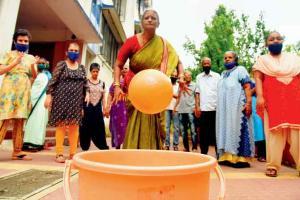
Residents of Balaji Healthcare, Vasind, play pass the ball to music during an evening leisure session. Pic/ Sameer Markande
Umesh Grover, 68, is a former mechanical engineer. For the last two years, he has been at the helm of La Compassion, a facility for elders located in Bhayandarpada, Thane. Having converted a group of apartments in an upmarket high rise into a well-equipped care centre for seniors, he is often sought after by families looking to settle their elders in a residential set-up that cares for their age-related needs.
ADVERTISEMENT
For the last few weeks, Grover has been setting out of the Thane facility to visit other old age homes in the neighbouring central suburbs. It's a recce, he says, to help some of his residents relocate. The lockdown has been a challenge for him and his staff of eight. No outsiders have been allowed entry. Grover is concerned that should one of his helps need to go on leave, finding a replacement will be impossible. Recently, he was compelled to request the families of two residents to take them home because they had grown "attendant-dependent". While the facility runs an assisted-living concept, with the staff helping the residents in their daily activities, including personal hygiene, feeding, grooming and assistance with meals, it's not equipped to handle fully-dependent seniors, especially during a staff crunch like now. Letting go hasn't been easy. Grover says he was deeply saddened to hear that one of the two residents, who had to leave, passed on barely 15 days after departure. "I thought they were taking him home. But I heard that the nursing home they moved him to was in deplorable condition."
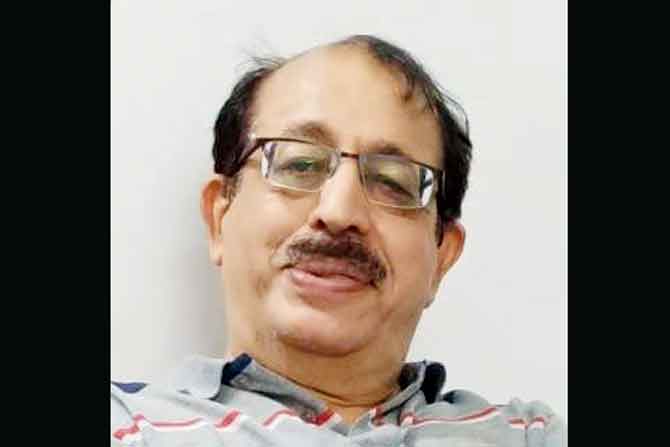
Umesh Grover, owner, La Compassion
Like Mumbai, cities across the world, including first world nations, are grappling with the urgent need to protect their senior citizens, a group most vulnerable to the COVID-19 virus according to medical experts. In March, Spain's state prosecutor launched an investigation after elderly patients were found abandoned or dead in retirement homes across the country. A recent set of emails released reveal that even before the lockdown was announced on March 19, hundreds of seniors in Madrid were found lifeless by soldiers who arrived at the centres to disinfect the premises. Another communication by the authorities is said to have instructed doctors not to hospitalise patients with symptoms above the age of 80 or those with particular physical conditions. Spain's death toll at nursing homes alone is estimated at 20,000.
In the Canadian city of Montreal, officials are investigating after health authorities were called to the Residence Herron elderly home, which was abandoned by the staff. By May 1, of the 33,365 total confirmed deaths in England and Wales, at least 12,526 or 38 per cent were care home residents, according to the latest estimates by the Office of National Statistics (ONS). In the US, the governor of New Jersey ordered a probe into a nursing home in the town of Andover, where 17 bodies had been found in a makeshift morgue.
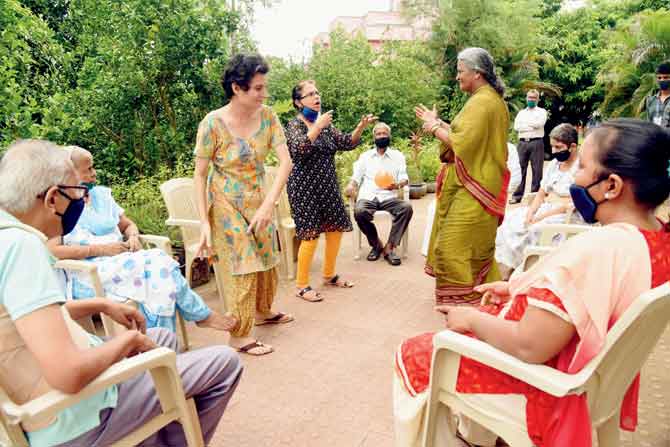 Located in Vasind on the outskirts of Mumbai, Balaji Healthcare is a 100-bed multispecialty hospital for elders. It offers medical treatment to seniors while inviting them to spend the rest of their lives in peace Pic/ Sameer Markande
Located in Vasind on the outskirts of Mumbai, Balaji Healthcare is a 100-bed multispecialty hospital for elders. It offers medical treatment to seniors while inviting them to spend the rest of their lives in peace Pic/ Sameer Markande
Section 19 of the Maintenance and Welfare of Parents' and Senior Citizens' Act, 2007 (MWPSCA) recommends that Indian state governments establish at least one old age home in each district with a minimum of 150 indigent senior citizens. Grover admits that Indian metros lack medical infrastructure support to address the specific needs of senior citizens, and the Coronavirus pandemic has only brought into full, ugly focus the shortfall. "To be honest," he says, "I wanted to shut down the centre temporarily, because it has been extremely stressful running it through the lockdown." Through March, and much of April, it was a struggle for the staff to access even essentials. When the local ward office ordered the shutdown of the local markets, Grover had to plead with online retail stores such as DMart to deliver his supplies. He says he continues to run the centre under duress since it hasn't been possible to rehabilitate the residents, many of whom are parents to Indians making a life abroad. "Some of their families are in the US, others in London and UAE. If I shut it down, where will they go?"
It is not like it has been easier for those whose families live within the city. Powai resident Ajit Nerurkar's aunt, who is visually impaired, has been living at an old age home for three years. In the first week of May, he was mortified when he learnt that she, along with 10 others at the Mulund centre, had tested positive for the virus. "I knew that they were taking all the necessary precautions, but sometimes, even a minor slip up can endanger lives." The founder and head nurse of the home, too, were infected. The society demanded for the home's closure and the infected residents were sent to a BMC hospital. The families of the remaining 19 residents were asked to take them home. "No one chooses to move family members to care homes because they don't love them enough. It's because we cannot manage them within the constraints of a household," he says. After 10 days, Nerulkar's aunt was to be discharged after being asymptomatic. As per the new order issued by the state government, patients who are under treatment for Coronavirus can be released within 10 days, if they do not show any symptoms of COVID-19, without any further tests. "She was supposed to be home quarantined, but I couldn't take her home because my housing society wouldn't allow it. Moreover, I have an 88-year-old mother, who is vulnerable to catching infection." Nerurkar's search for a worthy home care centre has been full of roadblocks since. He has been turned away by most places due to the curb on allowing outsiders admission. "I had to pay lakhs to get her temporarily admitted to a private hospital with an attendant," he shares. He has now managed to find a facility in Mulund, where she is expected to be shifted soon.
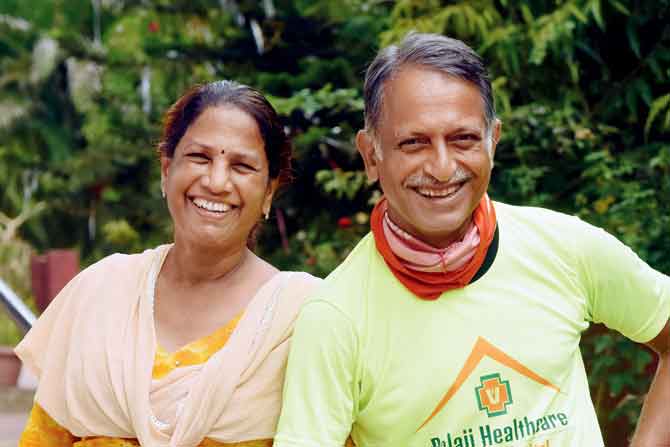
Dr Mahalaxmi Iyer and her husband Dr Ramani Brahma have been running Balaji Healthcare since 2011. Pic/ Sameer Markande
Those centres that continue to function such as Adharwad, Rajashram and Balaji Healthcare, have had to lay down strict guidelines. Dr Mahalaxmi Iyer's eldercare home-cum-hospital Balaji Healthcare is located on the outskirts of Mumbai in Vasind, Thane district. In 2011, she dipped into her savings to build the institution. "There haven't been too many cases of COVID-19 in the area. When the lockdown was announced, many care homes sent their residents back. I couldn't. When I take on a resident, I promise to keep him or her here for life. A majority of them suffer from chronic illnesses. Their children are not in Mumbai. Where would our 80 residents have gone?" she wonders.
Instead, Dr Iyer drafted a plan to make room for the staff on campus, offering them food and accommodation. That they didn't have to commute from home to work ensured no one left the centre or entered, keeping the seniors safe from infection.
Uttan's Rajashram, a charitable trust serving senior citizens, took precautions after the lockdown was announced. While it continues to function for its 65 residents, no new admissions are being allowed. "It's a precautionary measure," says Jay Suthar, managing director. "But if we do come across an emergency case, we will try to make arrangements for their stay on our premises."
 Residents at Anandvan Wellness Centre in Nalasopara West practice yoga
Residents at Anandvan Wellness Centre in Nalasopara West practice yoga
At Anandvan Wellness Centre in Nalasopara West, the 13 staffers haven't gone home in three months. Their original staff of 26 is now down to half since most rely on the local train to commute. "The residents tend to develop a strong bond with certain staffers, with whom they grow comfortable. When they don't see them around, they begin to get anxious and restless," explains co-founder Omkar Patil, who runs two care facilities for seniors with partner Akshay Bhoir. The Nalasopara centre, along with the one in Virar, houses patients with bipolar disorder, dementia and other neurological conditions. Patil says for such patients, even a minor trigger can set off an episode. And they have seen quite a few over the last two months. "We try to shield them from distressing news by putting a cap on their phone usage. But they are aware of what's happening around since their families tend to contact them often." Patil has had to face a barrage of questions about what next, and allay their fears.

Omkar Patil and Akshay Bhoir, co-founders of Anandvan Wellness Centre
Grover says he has had patients who have pleaded with him to keep the facility running as they did not want to go home. In fact, all the care homes that mid-day contacted confirmed that there is a general fear among the residents about the pandemic and leaving a safe, comfortable space. And it's not just the seniors who have required counselling, but staff too. Patil says that their attendants were offered one-on-one sessions with a psychologist to help them cope with their own fear and concern about the safety of their families, and strength to deal with patient challenges.
Things unfolded differently at Sharan in Vashi, a rehabilitation centre for paraplegics and home for senior citizens. Sachin Karkhile, admin head, Sharan, says that they provided all the regular facilities to their 56 residents during the three months of lockdown. "They were given meals, their hygiene was taken care of. But as soon as the lockdown eased in June, we decided to send all of them to their families. This is the right time for them to be with their relatives. Our staff commutes long distances in the city, and we didn't want them to be carriers of the infection. We don't know for how long this [COVID-19] will last, nor do we want to take a risk. This is in their best interest."
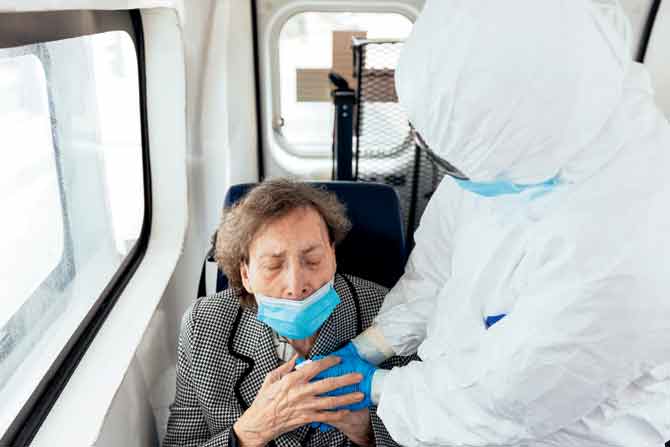
In this file photo taken in April, an elderly woman with COVID-19 holds the hands of a Spanish Red Cross volunteer as she is transferred from the Pyrenees residence to another residence where only Coronavirus infected are housed
Dr Siddharth Warrier, a city-based neurologist, discusses the ethical conflicts that the current circumstances have thrown up. Whether to inform seniors about the pandemic or not is a question with no straight answer. "On one hand, the patient deserves to know. But then, doctors have the responsibility of not traumatising their patients. Not everyone is going to take the news smoothly. It will, therefore, come as a shock." According to him, instead of letting them hear it from television and newspapers, it's their families, counsellors and doctors who should sit them down. "Let them process the information, and be assured that they will have love and support no matter what," Dr Warrier suggests.
In Sanpada's Vatsalya Trust, the residents were made to sign a document stating they were staying back voluntarily. Laxmi Desai, supervisor, says that until the lockdown, they had 18 residents. "We wanted them to go home to their families, but they refused. Some don't get along with their relatives, others are not welcome. But we didn't wish to take a chance, so we made them sign a document," she says. Of the 18, 12 continue to be at the facility. "There was a 91-year-old female resident who was feeling uneasy, so we asked her family to take her home. There was another elderly woman, who was diabetic and needed to go to the hospital. Her chances of bringing back the virus are high, so we have asked her not to return," Desai adds.
The drying up of funds is also driving care homes towards harsh measures. Maria D'Souza, proprietor of St Benedict Labour Of Love Old Age Home and Care Centre, Mira Bhayandar, says, seven members were sent to their respective homes due to non-payment of fees. "Sometimes, there's one breadwinner and the lockdown has led to people being laid off. Because they couldn't pay the monthly fee, families offered to take their relatives home."
Prasad Bhide, who runs Aajicare.com, a non-medical care organisation specialising in geriatrics, says the pandemic has led to a rise in mental illness, but especially among the elderly. "The three months have caused so much anxiety that several of them have slipped into depression."
Aneesh Issar is trustee at Caregiver Saathi, a community support group that aims to create an ecosystem of well-being for caregivers. "Families often lack the resources or the skills to take care of an elder. At the same time, they aren't able to bring in a person with skills to help out due to restrictions on movement across the city. It's a stressful situation." Through their website and social media presence, they have been producing content around this subject. Recently, they held a webinar on compassion fatigue. Compassion fatigue is described as a type of stress that results from helping or wanting to help those who are traumatised or under significant emotional duress. "Once a month, we are holding a support group meet up, where caregivers can learn from each other."
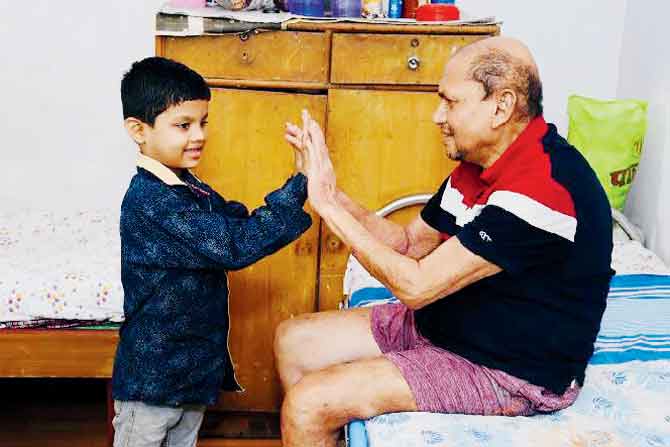
Much before the lockdown was imposed, residents of Adharwad could meet their family members regularly at the Navi Mumbai facility
For some, care centres have been a pillar of strength in dark times. In October 2019, 56-year-old Sujata Deb (name changed) underwent an intense seven-hour-long inguinal hernia surgery. While the operation was successful, the Vashi resident's doctor suggested bed rest for at least six months. This meant that Deb could no longer care for her nonagenarian mother, who suffers from Alzheimer's. "I visited a couple of old age homes in the city, and finally zeroed in on Adharwad, a philanthropic trust in Kopar Khairane, Navi Mumbai. It wasn't too hard to convince her to stay there. In fact, she was quite understanding of my situation. My husband and I have visited her every week," Deb shares. But the nationwide lockdown changed things for the family. "Every month, I purchase a pack of 60 diapers and send it across. On March 21, however, when I visited my mother to drop off the essentials, I was not allowed in." Sangeeta Bhagwat, founder of the facility, says that no family member of the 49 residents was allowed in since it would leave the mostly bed-ridden inmates— some paralytic, others battling neuro conditions—vulnerable. "Such patients require an attendant and we have a dedicated staff of 10. So, it only made sense to shut doors immediately," Bhagwat says.
Three months on, Deb has been speaking with her mother on video call. "They even send me pictures of her enjoying her meals. I know she is fine and in good hands," Deb says.
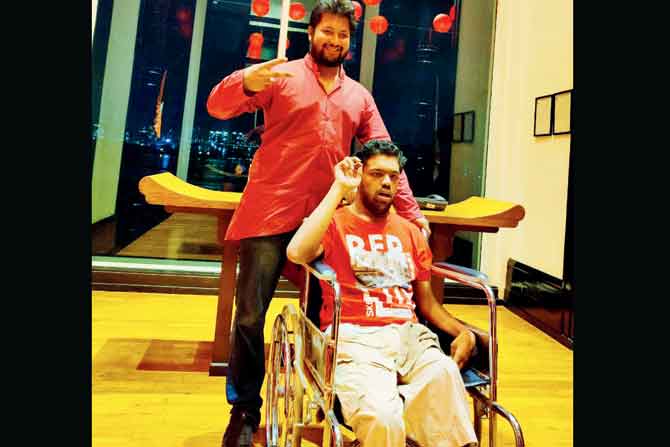
Rakesh Byndoor, 30, is unable meet his wheelchair-bound brother Ranjeet, lodged in Adharwad
Like her, Rakesh Byndoor, 30, could not meet his brother Ranjeet, who is a resident of Adharwad. He says, "A year-and-a-half ago, our mother passed away and I could no longer look after him. He is 25, and mentally and physically challenged. I run a spa in Airoli, and don't get the time to be with him. While the lockdown has restricted our meetings, I understand why the decision was taken by the foundation. We work and travel locally, we could be carriers of the virus. But once all this is over, I am definitely bringing him home for a few days. I miss him."
Handle with care
In the case of neuro patients being sent back home from care centres, Dr Siddharth Warrier says, "If a patient has Alzheimer's, he or she loses memory progressively. In advanced stages, they may not remember the names of family members. They become suspicious, they think you have hired someone to fool them, they feel the home doesn't belong to them, among other things. So when such a person returns home, relatives need to be extra careful. They need to not just provide physical assistance while taking a bath or feeding a meal, but also mental aid so that they don't panic." For those with Parkinson's Disease, Warrier suggests hiring a physiotherapist. "Such patients have their memory intact, but are not physically capable of moving around the house. Only a physiotherapist can help them get flexible enough to move from one place to another."
How Portugal is winning
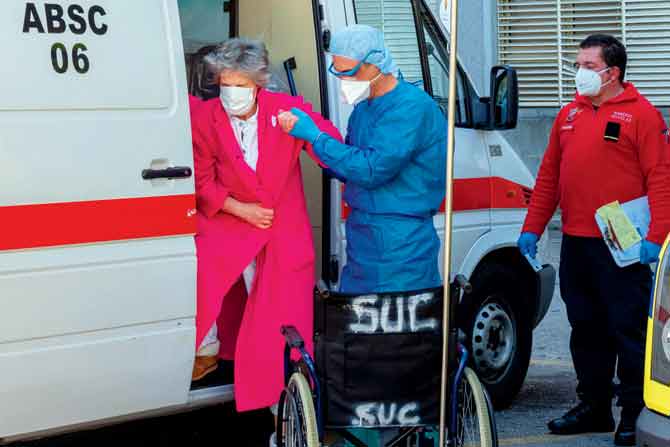
A nurse technician wearing protective gear helps a patient into a wheelchair before taking her to the pre-hospital triage tent for suspected COVID-19 patients in Santa Maria Hospital in Lisbon, Portugal. Pics/ Getty Images
Around 14 per cent of 2,500 Portuguese care homes have reported cases of Coronavirus. On May 18, care homes started to open doors under restrictions, including social distancing between visitors and residents. Several Portuguese care homes have even built glass windows to allow visitors to safely see their loved ones.
Assisted living residents in US start a campaign seeking pen pals
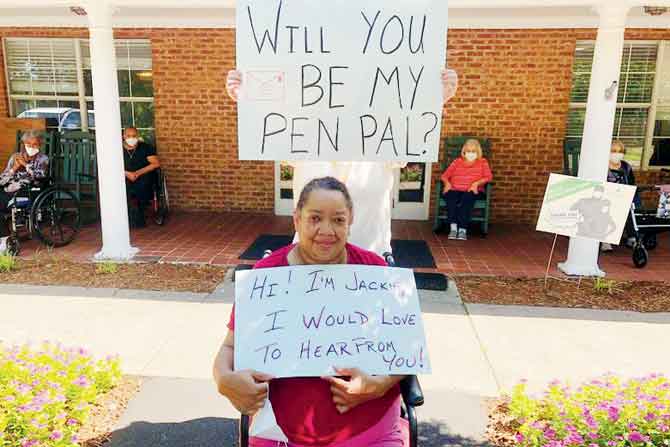
Pic/ Facebook
A strict no-visitor rule due to the pandemic over the past four months has driven an assisted living community in North Carolina to use social media to get its residents connected with people from all over the world. Victoria Senior Care, which manages 14 facilities in North Carolina, put up a post on Facebook that has garnered over 6.2k likes and 32k shares and an outpouring of support. "We hate that we are not able to have our normal visitors due to COVID-19 restrictions, so we at Phoenix Assisted Care would like to pass the time by writing to our pen pals! Send a letter to the address listed below with my name as the recipient. Can't wait to hear from you! #VSCPenPals" reads the post.
Catch up on all the latest Mumbai news, crime news, current affairs, and a complete guide from food to things to do and events across Mumbai. Also download the new mid-day Android and iOS apps to get latest updates.
Mid-Day is now on Telegram. Click here to join our channel (@middayinfomedialtd) and stay updated with the latest news
 Subscribe today by clicking the link and stay updated with the latest news!" Click here!
Subscribe today by clicking the link and stay updated with the latest news!" Click here!






